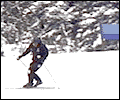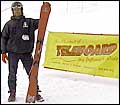Whassat? Boarding and Free Heeling Converge Until now, the only thing telemark skiing and snowboarding have had in common is a sort of camaraderie, the result of being bastard children of the big winter sports business. The snowboard industry pimps the hip side of being semi-shunned through renegade marketing of the yo-bro'-punk-hipsta-crippler dude riding scene.
 Telemark, though it was the original ski turn in the days of the first skis in mid-19th century Norway, was kicked in the teeth by nordic skiing and left to rot by the popularity of alpine.
Only recently has it bounced back into the picture. This rejuvenation has come from the growing interest of skiers in leaving lift lines behind and venturing into backcountry terrain. Competitive telemark ski racing during the last two decades has also put telemark on the map as part of the International Ski Federation (FIS) World Cup circuit.
Telemark, though it was the original ski turn in the days of the first skis in mid-19th century Norway, was kicked in the teeth by nordic skiing and left to rot by the popularity of alpine.
Only recently has it bounced back into the picture. This rejuvenation has come from the growing interest of skiers in leaving lift lines behind and venturing into backcountry terrain. Competitive telemark ski racing during the last two decades has also put telemark on the map as part of the International Ski Federation (FIS) World Cup circuit.
Now, the two converge as Uniboard Corporation of Connecticut has combined the snowboard and telemark set-up in the form of Teleboard — a single narrow board mounted with telemark bindings. Erik Fey was a snowboard instructor in Killington, VT when he and his brother, Martin, talked about the struggles of riding bumps on a snowboard. Martin then fabricated the Teleboard prototypes in his garage and sent them to Erik to try. "I made a narrower board, but it was too narrow to fit snowboard bindings," Martin said, "so I found some old telemark bindings in the garage and mounted them."
"It seemed like it would work. After a few falls and a learning curve, I left one with Erik. I went back to Connecticut and he called me back a few days later with suggestions on how to improve the construction, so I kept shipping boards up to him to test," Martin said. With the help of friend Ron Franzino and his wife Marie, Martin made the first boards from scratch using wood boards fitted with the edges of old skis. In December of 1996, Erik, wearing lace-up boots, first demoed the homemade boards at Stowe, VT. This season, there's a posse of teleboarders in New England with a rental fleet in Vermont at Smuggler's Notch, Mt. Snow and Bolton. In the west you'll find them in Colorado at Copper Mountain and Loveland, or through the telemark program at Bear Mountain, CA. Uniboard plans to expand during the '98-'99 to more Colorado resorts, Utah and Whistler, BC. At first the bindings were set straight forward like a water ski, but later the brothers decided to angle them slightly in order to drive the edges harder. "The most revolutionary thing," Martin recounted, "is not so much shape or length of the board, but that the telemark bindings are mounted with t-nuts diagonally and parallel... steeply angled forward facing, much more than a typical snowboard stance." The idea is that the bindings allow you to stay centered on the board, using more of a side-to-side motion to really get down and carve turns as opposed to the usual toe and heel side turns on a regular snowboard. Martin says lots of folks were nervous of the free heel. "This started as a bump machine, but it's evolved into the equivalent of a hard boot snowboard when it comes to carving power, but it exceeds that because it's also great in sloppy crud, steeps and powder. You can also get lots of spring with the free heel — it's very responsive," he said. They're playing with the flex. Right now the current model is fairly stiff compared to a ski, but relatively soft by snowboard standards. The Teleboard weighs about five pounds with the bindings. — Michelle Quigley, scoping new gear for The Mountain Zone
| |||||||||||||
[More Gear Reviews] [Marketplace]

